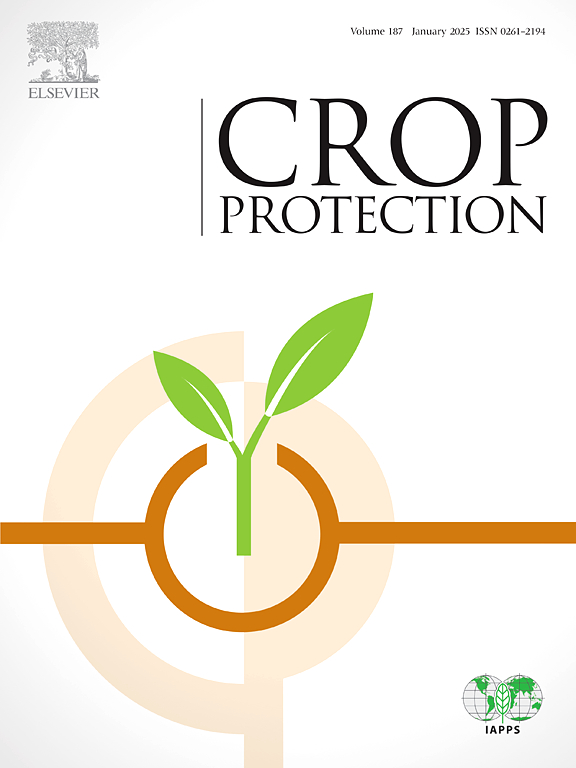Development and field performance assessment of roller rake weeder
IF 2.5
2区 农林科学
Q1 AGRONOMY
引用次数: 0
Abstract
Hand weeding is labor-intensive and time-consuming. Although mechanical weed extraction has the potential to save time and money on labor, several obstacles prevent its broad adoption, especially in rural and hilly areas. Small-scale farmers find power weeders to be expensive and impractical, and the haphazard planting of crops further restricts the machine's usefulness. Labor-saving, regionally tailored weed control methods are urgently needed, particularly in isolated highland areas. Owing to the numerous drawbacks of the current weeder, a new weeder called ‘roller rake weeder’ consisting of a fixed rake and a roller with spikes as soil-engaging components was developed as an alternative to solve the issues. The developed machine was tested in the field for about a month. It was observed that the speed of operation was found to be optimal ranging from 1.9 to 2.1 km h−1 with an effective cutting width of 140 mm. The actual field capacity ranged from 0.038 ha h−1 to 0.04 ha h−1, while the weeding efficiency reached 88%–95% surpassing the existing tools. The labor requirement was found to be 28.6–34.5 man-hours ha−1, while the average force required for forward and backward strokes during operation was observed to be 68.4 N and 23.2 N, respectively.
滚轮耙式除草机的研制及现场性能评价
手工除草是劳动密集型和耗时的。尽管机械除草有可能节省劳动力的时间和金钱,但有几个障碍阻碍了它的广泛采用,特别是在农村和丘陵地区。小农发现电动除草机既昂贵又不实用,而且随意种植作物进一步限制了机器的实用性。迫切需要省力、因地制宜的杂草控制方法,特别是在孤立的高地地区。由于目前除草机的诸多缺点,一种名为“滚轮耙除草机”的新型除草机被开发出来作为解决问题的替代方案,该除草机由一个固定耙和一个带尖刺的滚轮组成。研制出来的机器在野外进行了大约一个月的试验。观察到,操作速度在1.9 ~ 2.1 km h−1范围内是最佳的,有效切割宽度为140 mm。现场实际除草能力范围为0.038 ~ 0.04 ha h - 1,除草效率超过现有工具88% ~ 95%。劳动力需求为28.6-34.5人小时/小时,而在操作过程中,向前和向后划动所需的平均力分别为68.4 N和23.2 N。
本文章由计算机程序翻译,如有差异,请以英文原文为准。
求助全文
约1分钟内获得全文
求助全文
来源期刊

Crop Protection
农林科学-农艺学
CiteScore
6.10
自引率
3.60%
发文量
200
审稿时长
29 days
期刊介绍:
The Editors of Crop Protection especially welcome papers describing an interdisciplinary approach showing how different control strategies can be integrated into practical pest management programs, covering high and low input agricultural systems worldwide. Crop Protection particularly emphasizes the practical aspects of control in the field and for protected crops, and includes work which may lead in the near future to more effective control. The journal does not duplicate the many existing excellent biological science journals, which deal mainly with the more fundamental aspects of plant pathology, applied zoology and weed science. Crop Protection covers all practical aspects of pest, disease and weed control, including the following topics:
-Abiotic damage-
Agronomic control methods-
Assessment of pest and disease damage-
Molecular methods for the detection and assessment of pests and diseases-
Biological control-
Biorational pesticides-
Control of animal pests of world crops-
Control of diseases of crop plants caused by microorganisms-
Control of weeds and integrated management-
Economic considerations-
Effects of plant growth regulators-
Environmental benefits of reduced pesticide use-
Environmental effects of pesticides-
Epidemiology of pests and diseases in relation to control-
GM Crops, and genetic engineering applications-
Importance and control of postharvest crop losses-
Integrated control-
Interrelationships and compatibility among different control strategies-
Invasive species as they relate to implications for crop protection-
Pesticide application methods-
Pest management-
Phytobiomes for pest and disease control-
Resistance management-
Sampling and monitoring schemes for diseases, nematodes, pests and weeds.
 求助内容:
求助内容: 应助结果提醒方式:
应助结果提醒方式:


